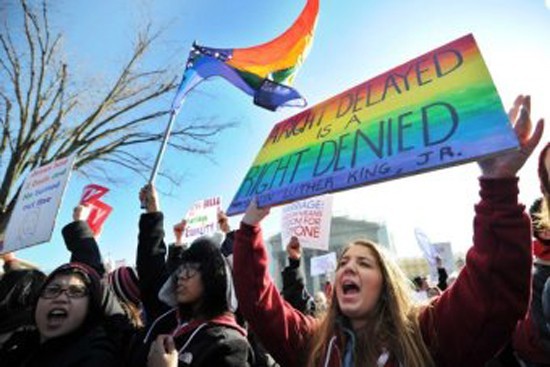
As the US Supreme Court grapples with the legality of banning gay marriage, it is becoming clear to even conservatives that equality is inevitable. Unfortunately, that’s a lesson neither side of Australian politics has yet learned, writes James Norman.
The tide of history is turning in favour of gay marriage, but in Australia our political and religious leaders seem stuck in the past. The question now is how long those pushing the anti-equality bandwagon will be able to hold out before they do irrevocable damage to the institutions they represent.
So despite the nod of Tony Abbott’s own daughters recently to embrace gay marriage, despite the courage of some strong lone voices within both major parties, despite the best efforts of the Greens, and despite the emotional pleas from parents and individuals all over the country, we are still in the backward situation of bipartisan opposition to allowing same-sex marriage in Australia.
We saw the hurtful diplomacy embraced by the church leaders play out on Q&A this week when Mark Coleridge, Catholic Archbishop of Brisbane, sitting next to gay comedian Josh Thomas, described homosexuality as a “warp in the creation”. Islamic Imam Dr Mohamad Abdalla could only say of gays “compassion should be showed toward them” and, more bitingly, that homosexuality “is very much like alcoholism”.
Such vicious words for such otherwise genial and intelligent men.
As someone who has enjoyed a four-year relationship with my loving boyfriend, it has become beyond tedious to have to endure this kind of thinly veiled bigotry and condescension. Relationships are not about ‘lifestyle choice’ and love is not something worthy of compassion. Nor is it a warp in creation. It is much, much better than that.
The US Supreme Court is currently grappling head-to-head with the overwhelming weight of cultural and political opinion that federal laws should not discriminate against people based on their sexual preferences. An 83-year-old woman Edie Windsor argued that she was unfairly hit with a massive estate tax bill because her partner was a woman.
The case was typical of the kind of legal limbo gays can find themselves in as long as the state continues to legally entrench discrimination. The Court Chief Justice John Roberts seemed more concerned with political expediency than moral questions last week when he noted to the courtroom, “As far as I can tell, political figures are falling over themselves” to support gay marriage.
But Chief Justice Roberts comments tell us more about the unstoppable tide of shifting public attitudes in a country that has historically often needed to shout before the rest of the world jumps. It was an acknowledgement that once the majority have determined that certain laws that once seemed acceptable and necessary have grown out-dated and now serve only to oppress, then it is a brave (or pig-headed) politician who will stand in the way of progress.
In politics, pragmatism must ultimately trump tradition if one is to stay in the game. It is a truth that has survived since Machiavelli, but one that Australian politicians might think carefully about as we approach a September election. In the US, we have witnessed many of those who once argued stridently against gay marriage now championing the cause.
One prominent example is David Frum, conservative writer and adviser to the Republican Party, who warned in 1993 that embracing gay marriage would come at the cost of “weakening America’s attachment to the traditional family even more than it has already been weakened”. Fast forward to 2013, and Frum is now leading the chorus that the Republicans have to get with the times and embrace gay marriage.
Indeed, the push for gay marriage should be a no-brainer for conservatives. Gay marriage could go some way in slowing the downfall of the institution of marriage – an institution whose appeal continues to dramatically fall as fewer and fewer people choose it – while the rate of childbirth out of wedlock continues to grow. The irony of gays actually resuscitating the dying institution of marriage is not lost on us.
Just as Malcolm Turnbull and others in Australia have long recognised, gay marriage is not a radical political proposition, as it in fact encourages a traditional mindset that relationships should be about matrimonial responsibility and mutual caring. It is also about society valuing its citizens equally, and not legally entrenching the notion that one group is somehow inferior owing to their biological make-up.
And yet in Australia we are still stuck behind the US and much of Europe in clinging to the traditional notion that a marriage can only be between a man and a woman to the exclusion of all others. That concept, implanted into our legal framework and burnt into our national psyche by John Howard, has proven a particularly potent tonic to overcome. We have simply lacked the political leadership required in Australia to do so.
Meanwhile, we are all captive to the seemingly unending and certainly unedifying political storms in Canberra that have left genuine, honest political and policy debate sadly neglected. But once that dust settles, as it inevitably will, whichever party has the honesty and courage to come out unambiguously in support of gay marriage will do so with the strong gusts of history behind them.
James Norman is a Melbourne writer and author. View his full profile here.
Author: James Norman
Publication: ABC The Drum Opinion
Publication Date: April 5, 2013
